Jambiani Village, a picturesque coastal community in Zanzibar, invites visitors to enjoy the daily lives of its vibrant and industrious female residents. These women showcase their traditional artistry, masterfully crafting intricate rope-making and beautifully patterned coconut fiber doormats. Visitors can not only observe but also participate in these artisanal pursuits, fostering a deeper connection with the community’s cultural heritage. Beyond the artistic realm, the lively interactions with children and opportunities to explore domestic spaces further enhance the cultural exchange, providing a well-rounded understanding of the women’s central role in Jambiani’s social fabric.
Key Points
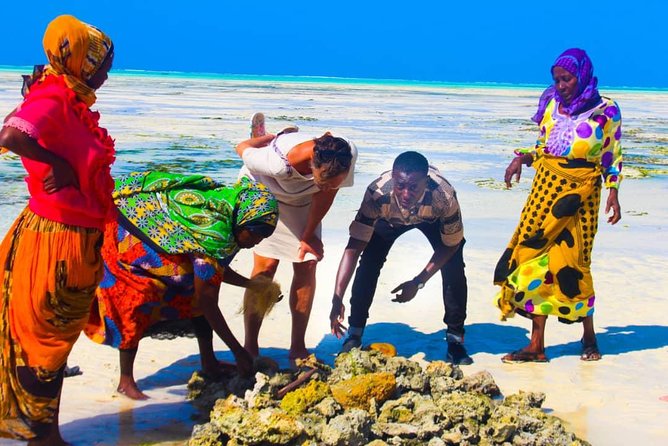
• Jambiani Village in Zanzibar is known for its vibrant culture and industrious female residents, who showcase traditional artistry and craftsmanship.
• Women in Jambiani demonstrate intricate rope-making techniques and the creation of beautifully patterned coconut fiber doormats, allowing visitors to observe and participate in these traditional artisanal pursuits.
• Visitors can engage in hands-on activities, such as weaving coconut fiber doormats and observing rope-making demonstrations, to gain a deeper appreciation for the skill and dedication required in traditional craftsmanship.
• Interactions with village children, including observing their traditional games and offering small treats, provide a glimpse into the vibrant spirits and growing responsibilities of the younger generation.
• Cultural experiences in Jambiani, such as learning to wear the kanga and exploring the homes and workspaces of local women, offer visitors an immersive understanding of the community’s traditions and customs.
Village Overview
Nestled along the eastern coast of Zanzibar, Jambiani Village is a picturesque seaside community known for its vibrant culture and the industrious spirit of its female residents.
This quaint village offers visitors a unique opportunity to enjoy the daily lives of the local women, who proudly showcase their traditional artistry and craftsmanship. From intricate rope-making to the creation of beautifully patterned coconut fiber doormats, the women of Jambiani demonstrate their remarkable skills and commitment to preserving their cultural heritage.
Beyond the artisanal pursuits, the village also provides a glimpse into the domestic spheres, where women play a central role in maintaining the community’s social fabric.
You can also read our reviews of more tours and experiences in Zanzibar.
Women’s Artistry
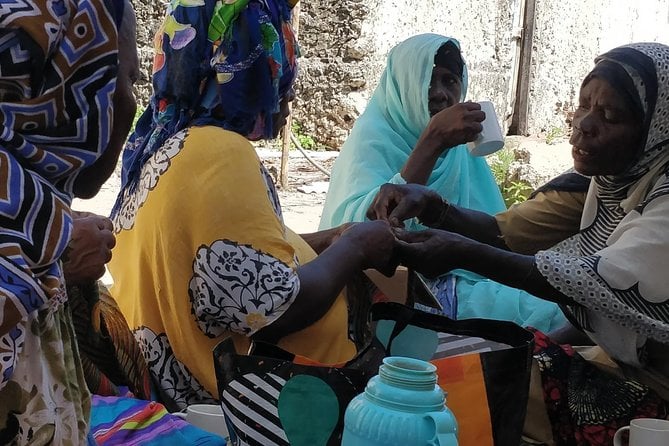
In an article titled ‘Jambiani Village Women at Work and Play’, it’s now time to discuss the CURRENT SUBTOPIC ‘Women’s Artistry’.
The women of Jambiani Village showcase their remarkable artistry through a variety of traditional crafts, from intricate rope-making to the creation of beautifully patterned coconut fiber doormats. Visitors have the opportunity to observe and even try their hand at these time-honored techniques, gaining a deeper appreciation for the skill and dedication of the local artisans.
The village offers a unique cultural experience, allowing guests to:
- Learn the art of kanga garment-making
- Explore the workspaces of female community members
- Observe children at play and interact with them
- Indulge in a delicious traditional lunch, if desired
Hands-on Activities
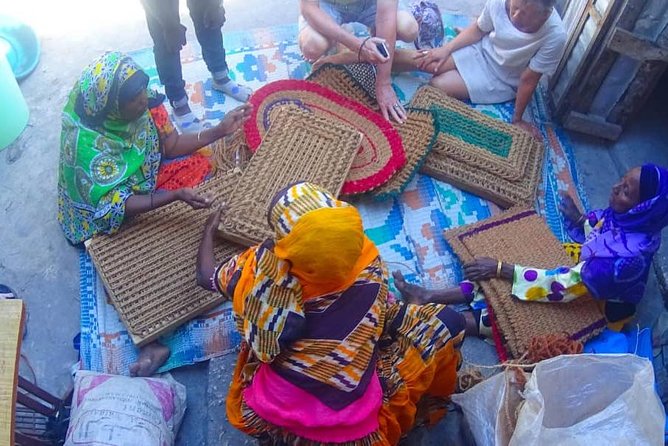
Visitors to Jambiani Village have the chance to enjoy the artistry of the local women by trying their hand at traditional crafts.
They can learn the intricate techniques of weaving coconut fiber doormats, gaining a deeper appreciation for the skill and dedication required to create these beautifully patterned masterpieces.
Under the guidance of skilled artisans, travelers can also explore the art of rope-making, watching in fascination as the women transform simple fibers into durable ropes.
The opportunity to participate in these hands-on activities allows visitors to connect with the community on a deeper level, fostering a greater understanding and respect for the village’s rich cultural heritage.
Children’s Interactions
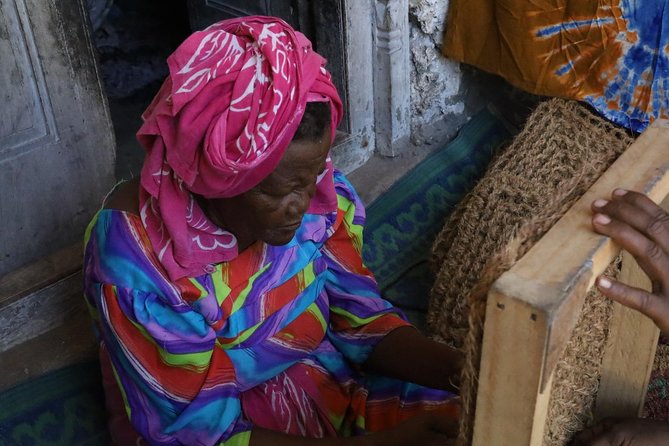
Tourists often have the opportunity to interact with the village’s children, offering them small treats like candy. This interaction allows visitors to observe the daily lives and vibrant spirits of the young members of the Jambiani community.
The children’s eyes light up with delight as they receive the unexpected gifts, their smiles spreading across their faces.
Visitors may witness the children playing traditional games, their laughter and carefree movements a testament to the simplicity and joy of their lives.
Observing the children at school or helping with chores provides a glimpse into the educational and familial responsibilities that shape their growing years.
These interactions foster a sense of cultural exchange, allowing both the visitors and the children to learn from one another.
Cultural Experiences
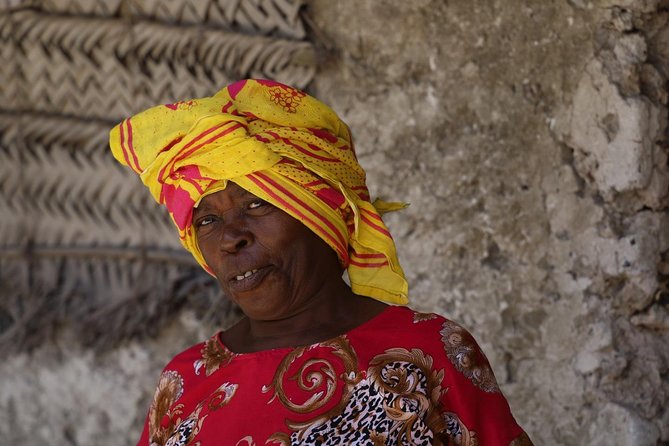
The cultural experiences on the Jambiani Village tour allow guests to enjoy the local traditions and customs. One engaging activity involves learning how to wear the kanga, a vibrant and distinctive piece of East African clothing worn by many women in the community.
| Kanga Wearing Steps |
|---|
| 1. Wrap the kanga around the waist |
| 2. Tuck the ends of the kanga into the waist |
| 3. Adjust the fabric to create folds and drapes |
| 4. Secure the kanga with a knot or pin |
| 5. Accessorize with jewelry or head wrap |
Guests can also explore the homes and workspaces of the local women, gaining insight into their daily lives and the important role they play within the community.
Dining Options
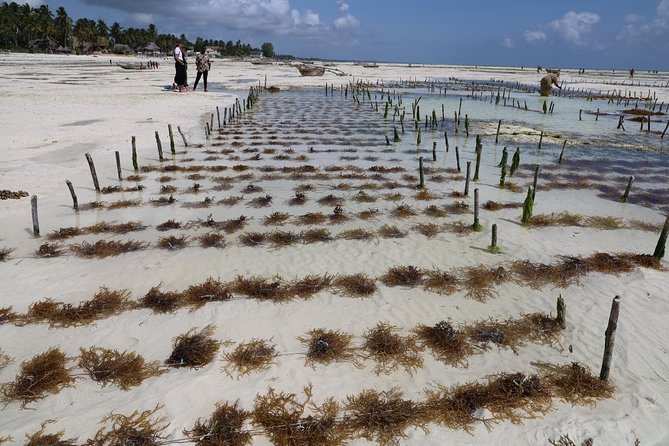
What’s more, the Jambiani Village tour provides an opportunity to enjoy a local lunch for an additional fee, with advance notice. Accommodations can be made for special dietary requirements as well.
After exploring the artistry and cultural traditions of the village, visitors can savor authentic Zanzibari cuisine, giving them a more immersive experience of the community.
The lunch may include:
- Pilau, a fragrant rice dish flavored with spices
- Kachumbari, a refreshing salad of tomatoes, onions, and cilantro
- Samosas, crispy pastries filled with vegetables or meat
- Chai, a spiced black tea, to complete the meal
This culinary experience allows travelers to connect with the local way of life in Jambiani.
Logistical Details
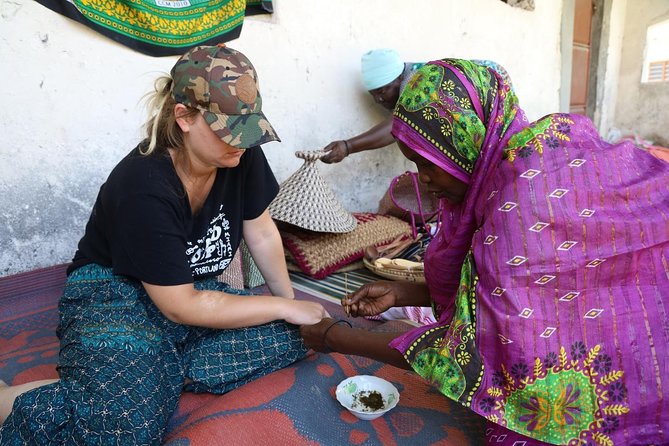
Along With the cultural experiences and dining options, the Jambiani Village tour offers convenient logistical arrangements for visitors. Pick-up from Stone Town hotels is available for an extra charge starting at $45, making it easier for travelers to reach the village.
While the tour duration is approximately 1.5 hours, not the 3 hours as initially described, most travelers can still participate comfortably. The tour isn’t wheelchair accessible, but the majority of visitors should be able to take part without difficulty.
Regarding the cancellation policy, there’s free cancellation up to 24 hours before the start of the experience, providing flexibility for travelers’ plans.
Cancellation Policy

Travelers can take advantage of the tour’s flexible cancellation policy, which allows for free cancellation up to 24 hours before the start of the experience. This policy provides guests with the peace of mind to plan their trip without worrying about unexpected changes or conflicts. The cancellation terms are straightforward and easy to understand, making it simple for travelers to adjust their plans if necessary.
The key points of the cancellation policy include:
- Free cancellation up to 24 hours prior to the tour
- No fees or penalties for cancellations within the allowed timeframe
- Hassle-free process to request a refund or reschedule the tour
- Flexibility to accommodate last-minute changes in travel plans
Frequently Asked Questions
Do the Women Speak English Fluently?
The local women may have varying levels of English proficiency, as it is not their native language. While some may speak it fluently, others may have more limited English skills and require translation assistance during the tour.
What Is the Typical Income of the Local Women?
The typical income of the local women in this region varies, but many earn modest wages from their artisanal work like rope-making and sewing. Their earnings support their families and contribute to the local economy.
Are There Any Ethical Concerns With the Tour?
There are some ethical concerns with the tour. While it aims to showcase local culture, interactions with children and potential exploitation of women’s labor merit consideration. Thoughtful implementation is needed to ensure the tour benefits the community.
Can Tourists Purchase Artisanal Products on the Tour?
Tourists can purchase a variety of handcrafted artisanal products during the tour, including rope-made items and woven coconut fiber doormats. The tour provides an opportunity to support the local women’s work and economy.
Are Tips Expected for the Local Guide?
Tips are generally expected for the local guide on this private tour, as they provide valuable insights and facilitate an enriching cultural experience. The amount is at the discretion of your, usually ranging from 10-20% of the tour cost.
Recap
Jambiani Village offers visitors a captivating glimpse into the daily lives of its industrious female residents.
Tourists can enjoy the community’s rich cultural heritage by observing and participating in traditional artisanal pursuits, fostering meaningful connections.
Children’s vibrant interactions further enrich the cultural exchange, providing a well-rounded understanding of the women’s integral role in Jambiani’s social fabric.
More Tour Reviews in Zanzibar
Not for you? Here's more things to do in Zanzibar we have recnetly reviewed
- 3 Best Guided Tours In Zanzibar
- 4 Best Cruises And Boat Tours In Zanzibar
- 2 Best Dining Experiences In Zanzibar
- 8 Best Full-Day Tours In Zanzibar
- 3 Best Food Tours In Zanzibar
- 3 Best Private Car With Driver Services In Zanzibar
- Jozani Forest Tour
- Fair Tourism In Paje
- Zanzibar Spice Farm Tour & Exotic Fruit Lunch
- Jozani Forest Tour
- Private Transfer From Abeid Amani Karume Airport to Zanzibar
- Zanzibar Tumbatu Island Cultural Experience
